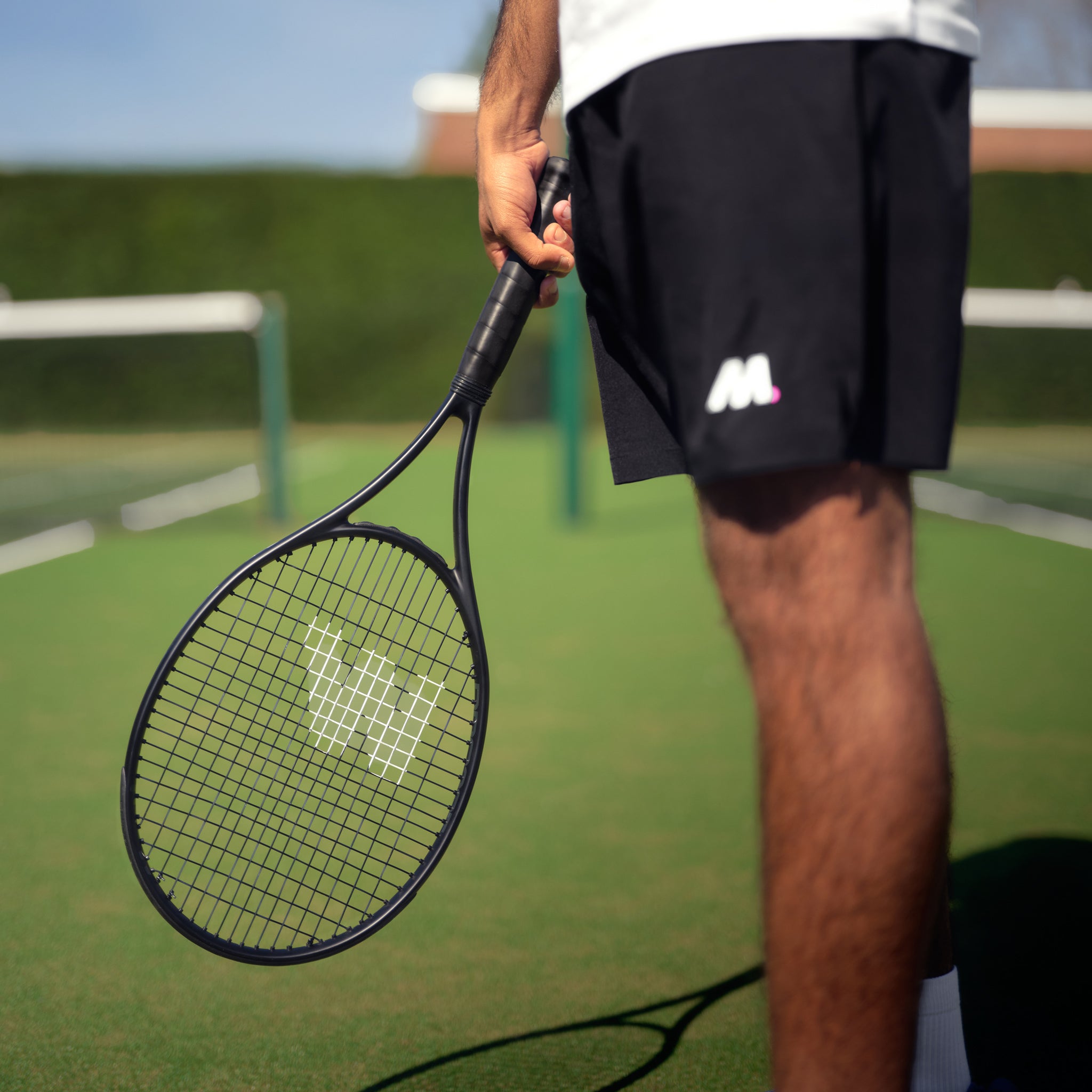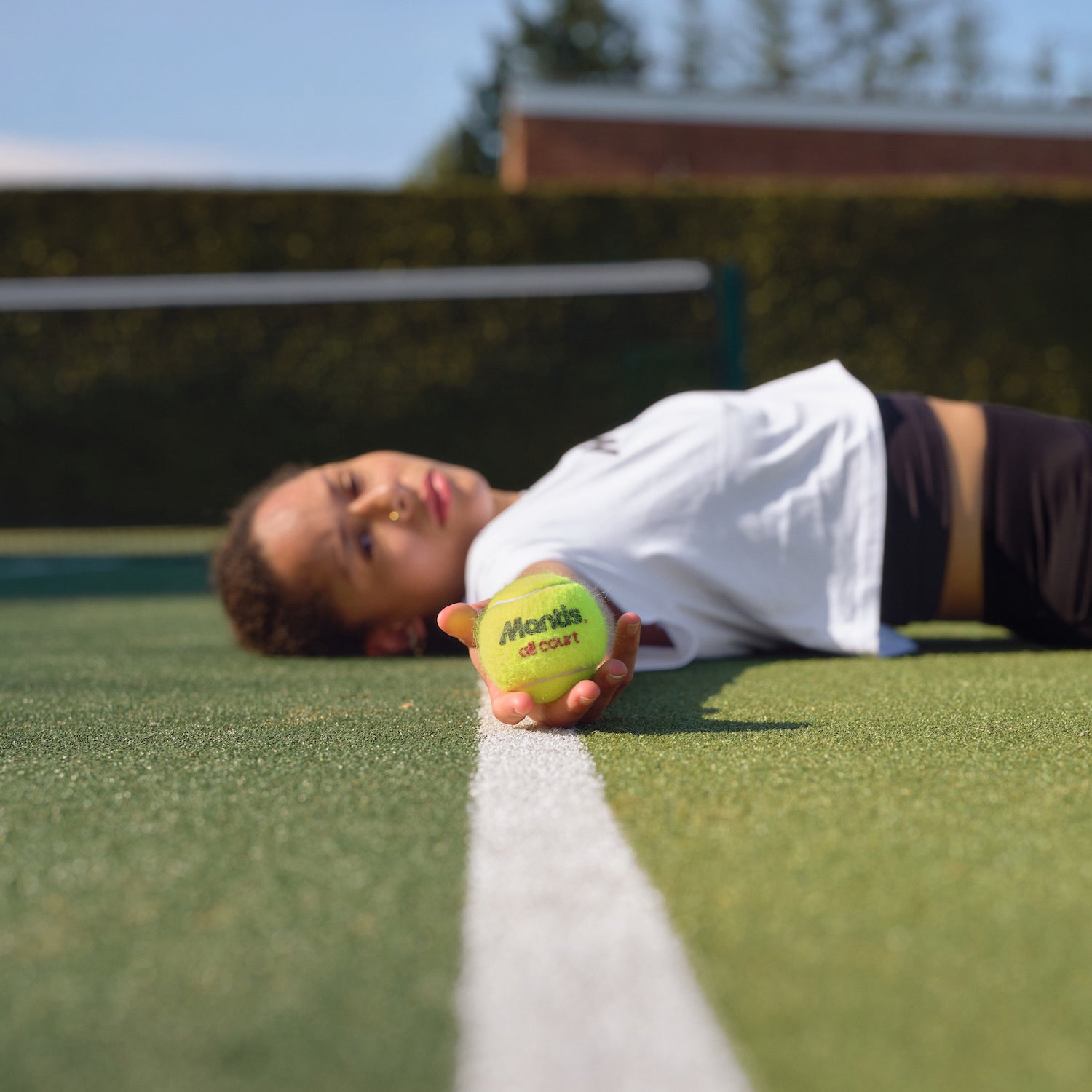
Ever wondered why some players seem to thrive under pressure, hitting their best shots when it counts, while others fall apart? The answer rarely comes down to a better forehand or a faster serve. More often than not, it’s found in the powerful, yet often overlooked, world of sports psychology in tennis. For more insights on improving your game, you can explore our other Mantis articles.
This is the unseen force that separates the good players from the truly great ones. It's what turns raw potential into consistent, match-winning performances.
Sports psychology in tennis: The Unseen Advantage in Your Tennis Game
In a game like tennis, the line between winning and losing is incredibly fine. A single double fault on break point or a fleeting moment of lost focus can be all it takes to decide a set, a match, or even a championship. We all spend countless hours on the practice court grooving our strokes, but it's the mental game that so often proves decisive—and it's the one part of our game we tend to neglect.
This is precisely where sports psychology offers a critical edge. Here at Mantis, we've seen it time and again: a player's mindset is every bit as important as their physical conditioning. The mental side of tennis isn't some mystical talent you're born with. It's a set of skills that can be learned, practised, and mastered, just like any other part of your game.
Mastering the Inner Court
Think of it like this: physical training gets you ready for the battle across the net, but mental training prepares you for the battle within your own mind. It’s all about getting a handle on that internal dialogue—the one that can either build you up or tear you down in a split second. The toughest opponent you'll ever face is often the one staring back at you in the mirror.
Proper mental training gives you the tools to manage the unique, intense pressure of one-on-one competition. It gets to the heart of the psychological factors that impact every single shot you hit:
- Emotional Regulation: This is about learning to control that flash of frustration after an unforced error or keeping a lid on the excitement after a huge point. Staying level-headed is key.
- Concentration and Focus: It's the ability to silence the distractions—whether it's a noisy crowd or your own negative thoughts—and stay completely locked in on the present moment.
- Confidence and Self-Belief: This means building an unshakeable belief in your own game, even when the scoreboard isn't in your favour.
- Resilience: Simply put, it's the art of bouncing back. It’s about not letting one bad point bleed into the next one and spiral into a lost game.
"What separates champions from the rest isn’t the absence of setbacks—it’s their ability to bounce back stronger."
Ultimately, sports psychology in tennis is about unlocking your true potential. It's about giving yourself the power to play your best when it matters most, ensuring your mental game is just as sharp and reliable as your physical one. In this guide, we'll walk you through the core ideas and practical drills you need to build this unseen advantage.
Understanding the Core Principles of Tennis Psychology
At the very centre of tennis psychology are a few key ideas that shape the entire mental side of the game. These aren't just abstract theories you'd find in a textbook; they are real, actionable principles that can help you build a truly formidable inner game. You can see more on how we approach game improvement in our other Mantis articles. Just as you strengthen your body with physical conditioning, mental training reinforces your mind, turning it into one of your most powerful assets on the court.
The journey starts with mental resilience. It’s best to think of this not as a trait you’re born with, but as a muscle. Every time you face a tough opponent, fight back from a set down, or simply push through a gruelling practice session, you're doing another rep and making that mental muscle stronger.
This strength is built up over time. It takes consistent effort and a conscious choice to see challenges as opportunities to grow, rather than as threats. With time, this mental conditioning allows you to withstand the immense pressures of a match without your form or spirit breaking down.
Finding Your Flow State
Every player dreams of being "in the zone"—that magical state of peak performance where everything just clicks. In psychology, we call this the flow state. It's that mental space where you are completely immersed in the match, acting with an energised focus and a genuine sense of enjoyment.
Getting into this state is rarely an accident; it needs the right conditions. It tends to happen when the challenge of the match is perfectly balanced with your skill level. It needs to be demanding enough to keep you hooked, but not so overwhelming that it triggers anxiety. Find that sweet spot, and self-consciousness just melts away, your movements become fluid, and your decisions feel almost automatic.
The flow state is where your preparation meets opportunity on the court. It’s that moment when your mind goes quiet, and your body just knows what to do, letting you play with pure instinct and freedom.
To create the conditions for flow, you have to stay in the present. Instead of worrying about the point you just lost or what the final score might be, your entire focus narrows to the ball, your opponent, and your strategy for this point. This singular focus is a cornerstone of elite performance. In the UK, the value of these mental skills has been recognised for a long time. Pioneers like Barbara Knapp (1920-1978) used her own tennis experience to explore psychological principles, highlighting the need to manage nerves and adapt emotionally during matches. Her work laid much of the groundwork for modern mental coaching.
The Power of Your Inner Voice
One of the biggest influences on your mental state is self-talk. This is the constant internal monologue running through your head during a match. This inner voice can be your greatest ally or your harshest critic. Let it fill with doubt and frustration, and you’ll fuel anxiety and tighten your muscles, which is a fast track to unforced errors.
On the other hand, positive and instructional self-talk can build you up. This isn't about blind optimism; it's about giving yourself constructive commands and encouragement when you need it most.
- Instructional Self-Talk: This focuses on simple, technical cues. Think "bend your knees" or "watch the ball onto the strings."
- Motivational Self-Talk: This uses encouraging phrases to keep you going. Things like "you can do this" or "stay tough" help maintain effort and belief.
By consciously managing this internal dialogue, you can steer your mindset away from negativity and towards a more productive, confident place. It's a skill that needs just as much practice as your backhand.
Focusing on Process Over Outcome
A final, critical distinction in sports psychology is the difference between an outcome goal and a process goal. It’s completely natural to want to win. But if you focus only on the final score—an outcome you can't totally control—you often create crippling pressure for yourself.
Outcome goals are all about the result (e.g., winning the tournament). Process goals, however, are the small, controllable actions you take to get to that outcome (e.g., making 80% of your first serves, or sticking to your game plan for every single point).
When you shift your focus to the process, you bring your attention back to what you can do right here, right now. This approach dials down anxiety, sharpens concentration, and, funnily enough, makes achieving your desired outcome far more likely. It’s all about winning one point at a time.
Developing Mental Toughness for High-Pressure Matches
We’ve all been there. A tense tiebreak, a crucial break point. It’s in these moments that tennis matches are truly won and lost. But here’s the secret: building mental toughness isn’t about making that pressure magically disappear. It’s about learning how to thrive right in the middle of it. For a deeper dive, check out our guide on how to build mental toughness.
To get there, we first need to understand what’s happening inside our own bodies and minds when the stakes are high. From there, we can start building a toolkit to manage it all.
When a match hangs in the balance, your body’s alarm system goes off. The adrenal glands flood your system with hormones like cortisol and adrenaline, getting you ready for ‘fight or flight’. While this is a brilliant survival mechanism, on the tennis court it’s less helpful. It can mess with your fine motor skills, cloud your judgement, and lead to that dreaded feeling of ‘choking’.
This physiological reaction is completely normal, but the difference between players is how they handle it. Interestingly, research suggests there might even be a difference in how genders respond. One UK-based study that analysed over 1,000 Grand Slam matches found that male players were almost twice as likely to see their performance dip on high-pressure points compared to female players, possibly due to higher cortisol spikes.
By looking at data, a coach and player can see exactly where and when pressure is having an impact. By looking at these numbers, you can spot patterns and start crafting targeted mental strategies for those big moments in your next match. Or consult a tennis industry expert for more advice
From Choking to Thriving
So, what separates a player who crumbles from one who rises to the occasion? It almost always comes down to focus.
Choking happens when a player's attention shifts from the process (hitting a clean backhand) to the outcome (the fear of losing the point). This sudden shift is what triggers anxiety, tightens up the muscles, and disrupts the smooth, automatic movements you’ve spent thousands of hours perfecting.
The solution is to stay anchored in the present. Instead of letting your mind race ahead to what might happen, you have to consciously pull your focus back to what you can control right here, right now. That is the essence of performing under pressure.
Building Your Mental Toolkit for Pressure
Mental toughness isn't some gift you're born with; it’s a collection of skills you can practise and sharpen. At Mantis, we believe any player can strengthen their mental game by working specific techniques into their routine. These are the tools that help you manage that stress response and keep a clear head when it matters most.
Here are three foundational techniques to get you started:
-
Controlled Breathing: When you feel your heart racing and muscles tensing up, your breath is the fastest way to regain control. Taking slow, deep breaths between points calms your nervous system right down, lowers cortisol levels, and brings your focus back to the present. A simple "box breathing" exercise—inhale for four, hold for four, exhale for four, hold for four—can work wonders in just 20 seconds.
-
A Solid Between-Point Routine: Those seconds between points are a golden opportunity to hit the reset button. A consistent routine gives you structure and stops your mind from wandering into negative thoughts. A simple four-step process is incredibly effective: briefly react to the last point, relax with a deep breath, prepare your plan for the next point, and then fully commit as you step up to the line.
-
Powerful Cue Words: Under pressure, your brain doesn't have time for complex instructions. Simple, powerful cue words can instantly snap your attention back where it needs to be. Words like "relax," "explode," or "feet" act as mental anchors. For instance, quietly saying "feet" to yourself before a serve reminds you to engage your legs, pulling your focus back to a fundamental part of your technique.
The following table summarises how you can apply these skills when you're in the heat of the moment.
Mental Skills for On-Court Pressure Situations
| Mental Skill | Description | On-Court Application (Example) |
|---|---|---|
| Controlled Breathing | Using deliberate breathing to slow heart rate and calm the nervous system. | Facing a break point, take a slow 4-second inhale and 4-second exhale before stepping to the baseline. |
| Between-Point Routine | A consistent, repeatable sequence of actions and thoughts between points. | After a double fault, turn your back to the court, adjust your strings, take a breath, decide on your next serve, and commit. |
| Cue Words | Simple, powerful words used to trigger a specific focus or physical action. | When feeling tight on a return, thinking the word "flow" can help relax your arms and promote a smoother swing. |
| Present-Moment Focus | Anchoring your attention on the current point, not past mistakes or future outcomes. | Instead of thinking "Don't miss this shot," focus solely on watching the ball onto your strings. |
By practising these skills, you can turn a moment of potential panic into a controlled, focused action.
"Pressure is a privilege – it means you are in a position to do something great. The goal is not to avoid it, but to learn how to embrace it as a signal that you are right where you want to be."
Ultimately, performing well under pressure comes down to one thing: trust. You have to trust your training, trust your game plan, and trust that you have the mental skills to handle whatever comes your way. If you practise these techniques with the same dedication you give your forehand, you’ll start turning those high-stakes moments from a source of fear into your greatest strength.
Essential Mental Skills and Training Drills
Knowing the theory behind sports psychology is one thing, but actually putting it to work on the court? That’s where the magic happens. A sharp mental game, just like a killer serve or a rock-solid backhand, is built through consistent, deliberate practice. It’s not an afterthought; it’s a core component of your training. For more practical advice to elevate your game, you can explore the insights in our other Mantis articles.
We're going to move past simply knowing what to do and start doing it. These drills are designed to be woven directly into your existing training sessions, making mental conditioning a fundamental part of your daily grind.
Mastering the Art of Visualisation
One of the most potent weapons in any player’s mental arsenal is visualisation. You might know it as mental rehearsal. This isn’t just idle daydreaming; it’s a focused practice of creating a vivid, detailed mental movie of yourself playing brilliantly.
This technique is so effective because it can activate the same neural pathways your brain uses during an actual match. You’re essentially building muscle memory and confidence before you even set foot on the court. Think of it as creating a mental blueprint for success. By repeatedly running through a perfect serve, a flawless rally, or a clutch match point in your mind, you are programming your body to execute when it really matters.
To make it truly stick, you have to engage all your senses:
- See the court in detail – the lines, the net, the spin on the ball as it flies towards you.
- Hear the crisp thwack of the ball on your strings and the sound it makes bouncing off the court.
- Feel the grip of the racket in your palm and the explosive first step towards the ball.
- Sense the atmosphere of the match and that feeling of calm confidence as you nail your shot.
Start small. Dedicate just five to ten minutes a day to this. Find a quiet spot, close your eyes, and walk yourself through a specific scenario, like serving out a tough game or executing a perfect drop shot under pressure.
Building Bulletproof Between-Point Routines
Those 20 to 25 seconds between points aren't dead time. Far from it. They are a golden opportunity to reset, refocus, and re-strategise. A consistent between-point routine is the anchor that keeps you steady through the inevitable storms of a match. Without one, your mind is free to drift, dwelling on a missed forehand or fretting about the next point—a recipe for disaster.
A simple but incredibly powerful routine can be broken down into four distinct phases.
- React & Release (4-5 seconds): First, allow yourself a brief, controlled emotional reaction to the last point, win or lose. Then, consciously let it go. A simple trick is to turn your back to the net; it's a physical cue that tells your brain it's time to move on.
- Relax & Recover (6-8 seconds): Now, use this time for a deliberate, calming breath. A slow inhale through the nose and a full exhale through the mouth works wonders to lower your heart rate and clear the mental clutter. Many pros fiddle with their racket strings here, using it as a physical focal point.
- Prepare & Plan (6-8 seconds): With a clear head, decide on your specific tactic for the upcoming point. Which serve are you hitting? Where's your target? What pattern of play are you looking to establish? Make it a single, clear instruction.
- Ritual & Respond (3-4 seconds): Finally, perform a small pre-point ritual, like bouncing the ball a set number of times. This last action signals that you're fully committed to your plan and ready to execute.
Practise this relentlessly. Do it not just in matches, but during every practice drill and training set. The goal is for this routine to become so automatic that it’s simply what you do under pressure.
A strong between-point routine is your mental fortress. It provides structure in the chaos of a match, allowing you to control your focus and energy, one point at a time.
Drills for Sharpening Concentration
Concentration is a muscle. The more you train it, the stronger and more resilient it becomes. Your focus will waver during a match—that’s human. The key is to shorten those lapses and get back on track quickly. Specific on-court drills are brilliant for this.
Here are a couple of recommended drills:
- Seam Spotting: As you rally during a warm-up, try to focus exclusively on the seams of the tennis ball as it comes towards you. This forces your brain to track the ball with incredible detail, which naturally shuts out other distractions. It's a simple exercise that trains your focus to become razor-sharp.
- Sound Focus: For this drill, your only goal is to listen intently for the sound of the ball hitting your opponent's strings, and then your own. By honing in on this single sound, you not only improve your reaction time but also anchor your attention firmly in the present moment, stopping your mind from wandering.
By slotting these practical drills into your regular training, you start treating your mental game with the same respect you give your physical technique. This holistic approach is the real key to unlocking your full potential on the court.
The Sports Psychologist's Role in a Player's Career
Behind every great serve and blistering forehand, there's a mind making it all happen. That's where a sports psychologist comes in—they're a crucial part of a player's support team, focusing not on the swing, but on the mental game. It’s easy to misunderstand their role, but these specialists are experts in performance, helping players build the mental strength needed for a long, successful career. You can learn more about how this fits into a wider support system in our article on professional tennis coaching.
This isn't about crisis management. It's a proactive partnership aimed at unlocking a player's true potential. At Mantis, we see working with a sports psychologist as a sign of strength and a smart investment in your future on the court.
It all starts with a deep dive. The psychologist will carry out performance profiling to pinpoint a player’s mental strengths and areas for improvement. This is often paired with mental health screenings to get a clear picture of their overall wellbeing. It’s a holistic approach that sees the person, not just the athlete.
From that starting point, they work together to craft a mental game plan. This isn't some off-the-shelf template; it's a completely personalised strategy designed around the player’s unique challenges and ambitions.
Navigating the Pressures of an Individual Sport
Tennis is a lonely sport. The moment you walk onto that court, you're on your own. That solitude cranks up the pressure and can take a serious toll. Unlike in team sports, where the load is shared, every point won or lost rests squarely on your shoulders.
This high-stakes reality makes tennis players particularly vulnerable to mental health struggles. Research into sports psychology within UK tennis has shone a light on issues like depressive symptoms and obsessive-compulsive traits among elite players. In fact, studies have found that rates of depression among athletes can range anywhere from 4% to 80%. Athletes in individual sports often feel this more acutely because of the intense pressure and isolation.
A sports psychologist gives players the tools to build robust coping mechanisms, teaching them how to handle the emotional rollercoaster of big wins and tough losses with real resilience.
Building a Partnership for Long-Term Success
The relationship between a player and their sports psychologist is a long-term collaboration. It’s a confidential, judgement-free space where an athlete can talk openly about their fears, anxieties, and goals. And the work goes so much deeper than just "thinking positive."
Working with a sports psychologist isn't about fixing something that's broken. It's about sharpening your greatest competitive weapon—your mind—and building a career defined by resilience, not just results.
These sessions are all about developing tangible skills. Think of it like a mental gym, where you might work on:
- Confidence Building: Practical strategies to keep your self-belief solid, even during a slump.
- Emotional Regulation: Techniques to stay calm and focused after a bad line call or a string of unforced errors.
- Burnout Prevention: Learning how to manage the relentless physical and emotional demands of the tour.
- Injury Rehabilitation: Getting the mental support needed to navigate the frustrating road to recovery.
Overcoming the Stigma
Thankfully, the old-fashioned stigma around seeking mental support in sports is finally breaking down. Players at every level are starting to see that mental conditioning is just as important as physical training.
Deciding to work with a sports psychologist isn't a sign of weakness. It’s a statement that you’re committed to mastering every single aspect of your game. It’s a strategic choice to invest in your longevity and well-being, ensuring you can not only perform at your peak but actually enjoy the journey, too.
Weaving Mental Strength into Your Daily Game
If there's one central message to take away from our journey into tennis psychology, it's this: mental training isn't a quick fix. It's a continuous, core part of your development as a player. For a deeper look into our approach, feel free to explore our other Mantis articles. Here at Mantis, we see psychological skills as deserving the same dedication you give to your physical conditioning and technical practice.
This guide has walked you through core principles, practical drills, and strategic insights. It’s all designed to empower you to take ownership of your mental game, leaving you with the confidence and knowledge to start making changes right away.
From Theory to On-Court Reality
Turning these ideas into real, on-court skills takes consistent, deliberate effort. Think about it: you drill your forehand until it’s automatic. You need to do the same with your between-point routine or your visualisation techniques until they become second nature.
- Consistency is the secret sauce: Carve out a small portion of every single training session for a mental drill.
- Start small, win big: Begin with just one technique, like controlled breathing. Master it before you even think about adding another.
- Track your progress: Pay attention to how your mindset shifts during those tough matches as you become more skilled.
Of course, peak mental performance on the court is deeply connected to your overall physical well-being. Understanding the essential role of Vitamin B Complex for brain health and sustained energy can be a crucial piece of the puzzle, supporting your mental game and preventing those lapses in focus that come from fatigue. It’s a holistic approach that ensures your mind and body are truly working in sync.
The Endless Journey of a Tennis Player
The most mentally tough players get it: the work is never really done. Every match is a new psychological puzzle to solve. It’s another chance to build your resilience, sharpen your focus, and deepen your self-belief.
Mental strength is not a destination you arrive at, but a path you walk every time you step onto the court. It's the commitment to continuous self-improvement, one point at a time.
When you embrace this process, it changes everything—not just how you compete, but how much you enjoy the sport. By weaving these principles into your daily routine, you're not just playing tennis; you're investing in a longer, healthier, and more fulfilling career on the court. The real victory, after all, lies in mastering the opponent within.
Frequently Asked Questions
Stepping into the world of sports psychology can feel a bit like learning a new shot—it’s exciting but naturally comes with a few questions. We get it. Here are some of the most common queries we hear from players who are ready to sharpen their mental game.
I’m a Beginner. Where Do I Even Start with Mental Training?
The biggest mistake is trying to do everything at once. Just like you wouldn't try to master a kick serve and a slice backhand in the same week, you need to pick one thing and build from there.
The best place to start? Your between-point routine. You do this dozens, sometimes hundreds, of times in a match, so it's the perfect opportunity to build a mental habit that sticks.
- Step 1: Reset. The moment the point ends, turn your back to the net. This simple physical act creates a mental break.
- Step 2: Breathe. Take one deliberate, slow, deep breath. This calms your nerves and brings your heart rate down.
- Step 3: Plan. Decide on one clear, simple intention for the next point. Nothing complicated.
- Step 4: Commit. Turn back to face your opponent, ready to execute that one plan.
By focusing on just this one simple sequence, you're laying the foundation for mental discipline and focus without feeling overwhelmed. It’s about building momentum, one point at a time.
When Should I Think About Seeing a Sports Psychologist?
Honestly, there’s no bad time. But it's a huge myth that you should only seek help when you're in a crisis. The best players in the world work with sports psychologists proactively to find that extra 1%, not just to fix a problem.
That said, there are some clear signals that talking to a professional could be a game-changer. Consider reaching out if you’re noticing patterns like:
- Your performance in matches is consistently worse than in practice.
- You're struggling to find the motivation to get on court or feel totally burned out.
- Match day nerves are so intense they’re hurting your game.
- You can't seem to shake a tough loss or get your confidence back after an injury.
Seeing a sports psychologist isn't a sign of weakness. It's a power move. It shows you’re treating your mental game with the same respect you give your physical conditioning.
How Do I Stay Mentally Tough When I'm on a Losing Streak?
A string of losses can feel brutal. It chips away at your confidence and can make you question everything. The secret to getting through it is to stop focusing on the scoreboard and zoom in on the process.
First, you need to redefine what "winning" looks like for a while. Instead of the final score, set small, controllable process goals. For your next match, success might be hitting 70% of your first serves in, or sticking to your between-point routine after every single point, good or bad.
This is also the time for honest reflection, not self-destruction. Analyse your matches. What’s really happening? Are you losing focus on big points? Is a technical flaw breaking down under pressure? A losing streak, when you look at it this way, stops being a crisis and becomes a valuable, if tough, period of learning. It’s how you build real, lasting resilience.
At Mantis, we create performance tennis equipment for players who are serious about their game. Our rackets, balls, and gear are engineered with precision for those who live for progress. Explore our collection and find the tools to match your ambition at mantissport.com.










